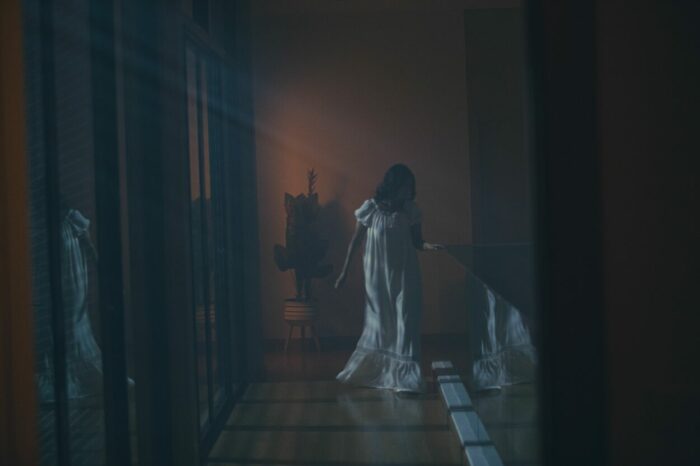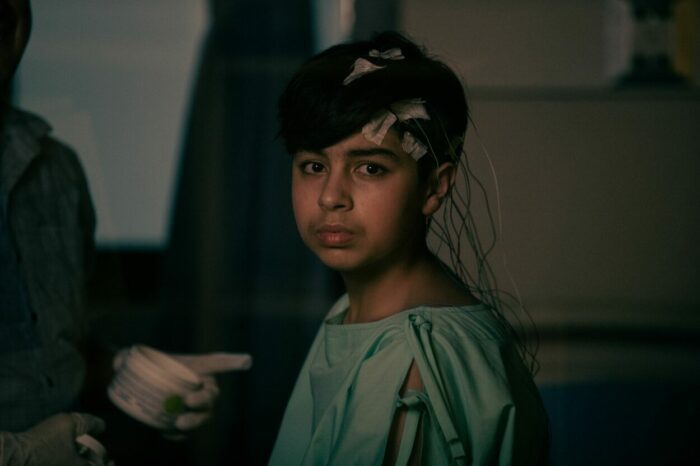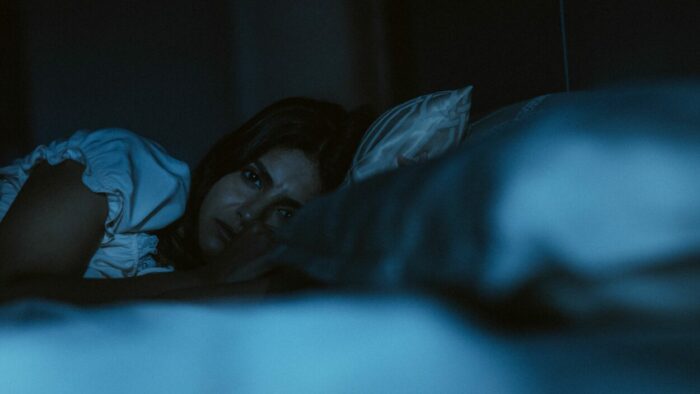Unlike Nayla Al Khaja, the director/co-writer/producer of Three, a supernatural psychological horror film from the United Arab Emirates, I have never witnessed an exorcism. Al Khaja’s film is based on one the director herself witnessed, and I can only imagine the terror it, or the presumed possession necessitating it, might entail. At its best Three conveys the mortal panic a caring mother might experience when there seems no alternative but to subject her own son to an exorcism. It makes for an excellent entry in the possession/exorcism genre, one with historical importance as the first feature film ever directed by a woman from the U.A.E., where Al Khaja has blazed a trail in an industry largely closed to women.
Maryam (Faten Ahmed) is a progressive, divorced, successful Emerati businesswoman and mother to 13-year-old Ahmed, a pleasant young boy whose sudden affliction of stuttering marks him as the target of school bullies. Typically soft-spoken and mild-mannered, Ahmed’s encounters with others begin to escalate from seizure-like episodes to outright assault: in fairly short order, the boy—apparently under no physical or mental control of his own body—attacks a schoolmate and a teacher, finding himself expelled and sending poor Maryam searching for answers.

Maryam’s sister Noora (Noura Alabed), far more conservative than she, is certain the boy is possessed, that Maryam’s liberal ways have invited the boy to be possessed by djinns. The only cure is to visit a Mullah to exorcise the possessive evil spirit. But a trip to a shadowy Mullah and his strange acolytes goes poorly. Noora remains resolute that the boy is possessed, and poor Maryam is left with little hope. Only then does Maryam turn to a more Western solution, the British Dr. (Mark) Holly (Jefferson Hall), whose empathy for the family’s situation outpaces his medical understanding of what is plaguing poor Ahmed.
Dr. Holly’s presence makes for an interesting culture clash between his Western scientific progressivism and the strongly held Muslim beliefs exhibited by Maryam’s sister Noora. Dr. Holly’s methodical approach, a cautious mix of psychiatric evaluation, diagnostic assessments, behavioral modifications, and experimental medication stands in start contrast to Noora’s demands for an immediate and and complete exorcism of the djinns she is certain have possessed her nephew. Noora’s distrust for the doctor’s methods make her even more suspicious of the friendly rapport he and Maryam begin to develop, one that seems on the verge of a romance.
Those are the conflicts that set the stage for the middle and third acts of Three as it develops into a psychological horror film set in the possession subgenre. Ahmed’s episodes become more frequent and more worrisome. There is cause for deep concern when he’s left alone with a female classmate, this after his attacks on a schoolmate and teacher: what were the adults thinking? As rational and deliberative as the British doctor’s efforts are, they make little progress. He observes something Maryam hasn’t—the boy has developed a fused toe on his left foot, one that looks suspiciously like a cloven hoof of medieval Christian imagery—and in desperation, Maryam agrees to Noora’s demands for a second attempt at exorcism.

Here, the film fully invests itself in the tropes of the exorcism genre. Poor Ahmed—with his family and the doctor watching—is subjected to a painful, torturous, and horrifying attempt to exorcise the djinns. Shot in fragmented close-ups and enacted with a credited contortionist and prominent Foley effects, the exorcism scenes may not suffice to frighten the genre’s most ardent and demanding fans, but they’re more than enough to convey the kind of panic that must be present when a mother witnesses her child subject to excruciating torment.
Three finds itself on its surest ground in exploring the tensions between religious fundamentalism and rational progressivism. At times the character of Noora seems to exist primarily as a foil to Maryam, to question her liberalism, her parenting, her lifestyle, and even her budding affection for Dr. Holly, more so than as a fully realized and three-dimensional character herself. Her character seems like the villain of the piece with her constant criticisms of Maryam, no matter where the plot ultimately leads. (And it leads somewhere entirely unexpected by its end, with a brief post-credit scene—more of an image, really—appended.)

As Maryam, Faten Ahmed has a complex task: she’s a loving mother, capable career woman, and exceedingly patient sister, pulled taut between Islamic belief and Western medicine. Beautiful and poised, she almost never loses her cautious reserve. As Dr. Holly, Jefferson Hall looks a bit like a fashionably scruffy Saint-era Roger Moore (if you can imagine such a thing; Simon Templar was never unshaven), and he and Ahmed look like a movie-star pairing from central casting. Were it not for the matter of the boy’s possession, the three of them together would seem an ideally potentially reconstituted family, and Hall is plenty convincing even when the role has him making frequent house calls and even offering up his own luxurious abode to Maryam and her son.
A lot rides on the performance of Saud Alzarooni as Ahmed, who must convincingly play a deferential, mild-mannered young boy prone to fits and outbursts. His character undergoes as traumatic a film experience as one can imagine, and in his young teens during filming, must have channeled some palpable emotion to convey Ahmed’s possession. When his character experiences a fit—most of them brought on by adolescent feelings of shame or arousal—Alzarooni conveys the change in character effectively enough to elicit sympathy rather than fear. The poor lad certainly gets put through the wringer when the Mullah and his acolytes get their opportunity to—literally—beat the devil out of him.
With Three, director-writer Al Khaja is certainly cognizant of, and in some ways resistant to, its genre underpinnings. Films like The Exorcist (1973), Djinn (2013), and Under the Shadow (2016) seem like obvious precedents moving the genre from Hollywoodization towards the Arabic, and Three, under Al Khaja’s helm, knowingly exploits generic tropes without kowtowing to them. It’s a sign of the director’s promise to convey something more than mere horror, to make the possession it adroitly depicts more than merely demonic.



![[L to R] Conor McGregor and Jake Gyllenhaal as Knox and Dalton in Road House (2024). Amazon MGM Studios. Bearded Knox attempting to stare down the zen like Dalton in a dive bar as the two get ready to fight.](https://filmobsessive.com/wp-content/uploads/2024/01/road-house-RDHS_2024_UT_221006_RADLAU_10908_R_rgb-200x133.jpg)
